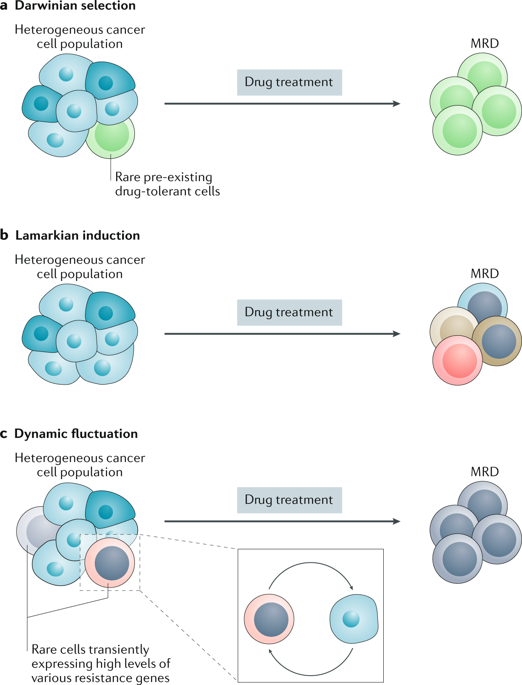当前位置:
X-MOL 学术
›
Nat. Rev. Drug. Disc.
›
论文详情
Our official English website, www.x-mol.net, welcomes your feedback! (Note: you will need to create a separate account there.)
The great escape: tumour cell plasticity in resistance to targeted therapy.
Nature Reviews Drug Discovery ( IF 120.1 ) Pub Date : 2019-10-10 , DOI: 10.1038/s41573-019-0044-1 Soufiane Boumahdi 1 , Frederic J de Sauvage 1
Nature Reviews Drug Discovery ( IF 120.1 ) Pub Date : 2019-10-10 , DOI: 10.1038/s41573-019-0044-1 Soufiane Boumahdi 1 , Frederic J de Sauvage 1
Affiliation

|
The success of targeted therapies in cancer treatment has been impeded by various mechanisms of resistance. Besides the acquisition of resistance-conferring genetic mutations, reversible mechanisms that lead to drug tolerance have emerged. Plasticity in tumour cells drives their transformation towards a phenotypic state that no longer depends on the drug-targeted pathway. These drug-refractory cells constitute a pool of slow-cycling cells that can either regain drug sensitivity upon treatment discontinuation or acquire permanent resistance to therapy and drive relapse. In the past few years, cell plasticity has emerged as a mode of targeted therapy evasion in various cancers, ranging from prostate and lung adenocarcinoma to melanoma and basal cell carcinoma. Our understanding of the mechanisms that control this phenotypic switch has also expanded, revealing the crucial role of reprogramming factors and chromatin remodelling. Further deciphering the molecular basis of tumour cell plasticity has the potential to contribute to new therapeutic strategies which, combined with existing anticancer treatments, could lead to deeper and longer-lasting clinical responses.
中文翻译:

大逃亡:肿瘤细胞可塑性抵抗靶向治疗。
靶向治疗在癌症治疗中的成功已受到多种耐药机制的阻碍。除了获得赋予抗药性的基因突变外,还出现了导致药物耐受的可逆机制。肿瘤细胞的可塑性驱动它们向不再依赖药物靶向途径的表型状态转变。这些药物难治性细胞构成了一组慢循环细胞,它们可以在治疗中断后恢复药物敏感性,或者获得对治疗的永久耐药性并推动复发。在过去的几年中,细胞可塑性已成为一种针对性的规避治疗的模式,可用于前列腺癌,肺腺癌,黑素瘤和基底细胞癌等多种癌症。我们对控制这种表型转换的机制的理解也得到了扩展,揭示了重编程因子和染色质重塑的关键作用。进一步破译肿瘤细胞可塑性的分子基础有可能有助于新的治疗策略,与现有的抗癌治疗相结合,可以导致更深,更持久的临床反应。
更新日期:2019-10-10
中文翻译:

大逃亡:肿瘤细胞可塑性抵抗靶向治疗。
靶向治疗在癌症治疗中的成功已受到多种耐药机制的阻碍。除了获得赋予抗药性的基因突变外,还出现了导致药物耐受的可逆机制。肿瘤细胞的可塑性驱动它们向不再依赖药物靶向途径的表型状态转变。这些药物难治性细胞构成了一组慢循环细胞,它们可以在治疗中断后恢复药物敏感性,或者获得对治疗的永久耐药性并推动复发。在过去的几年中,细胞可塑性已成为一种针对性的规避治疗的模式,可用于前列腺癌,肺腺癌,黑素瘤和基底细胞癌等多种癌症。我们对控制这种表型转换的机制的理解也得到了扩展,揭示了重编程因子和染色质重塑的关键作用。进一步破译肿瘤细胞可塑性的分子基础有可能有助于新的治疗策略,与现有的抗癌治疗相结合,可以导致更深,更持久的临床反应。


























 京公网安备 11010802027423号
京公网安备 11010802027423号